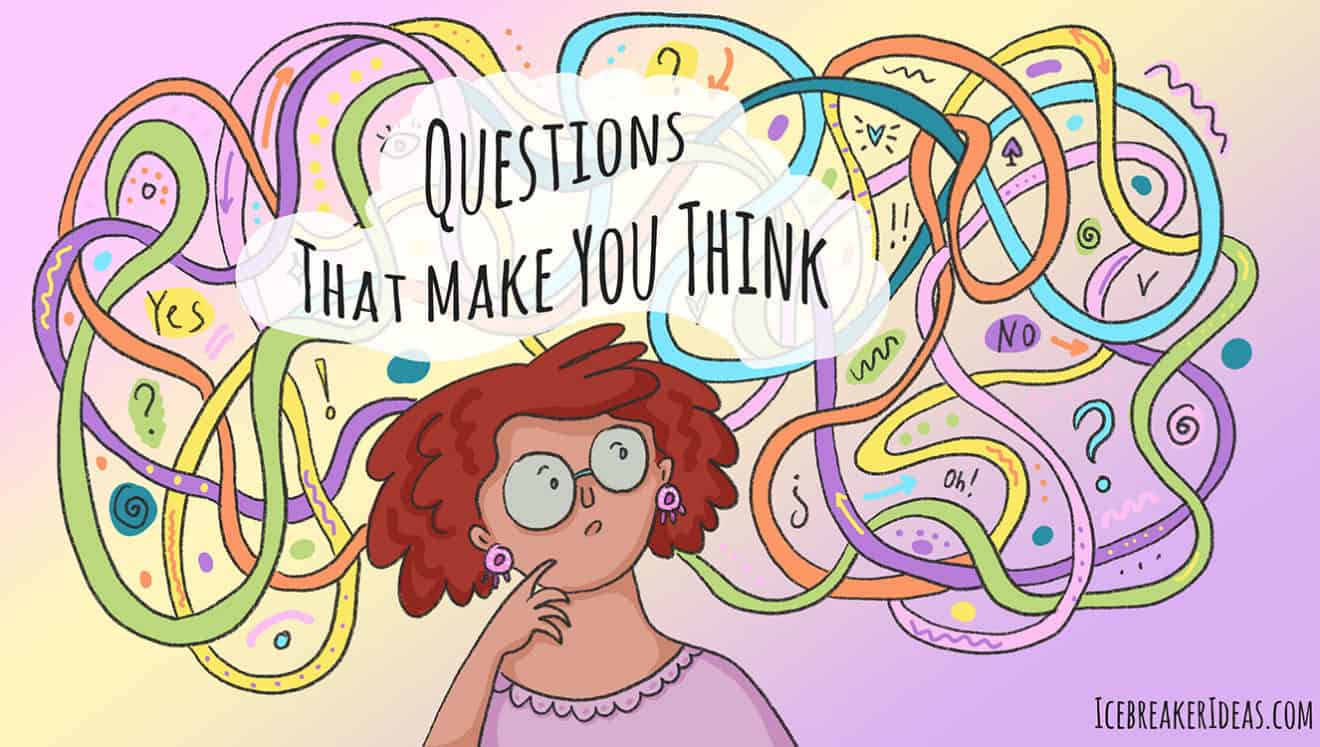Ever wondered why we ask dumb questions that make you think? Well, buckle up, because this ride is about to get interesting. In a world full of answers, sometimes it's the "dumb" questions that lead to the most profound realizations. You know, the ones that make you pause, scratch your head, and go, "Wait, why haven't I thought about that before?" Yep, those questions are the real MVPs of curiosity. They might seem silly at first, but trust me, they pack a punch.
Now, let's get real for a sec. We live in a society where asking questions is often judged. People might label certain questions as "stupid" or "dumb," but here's the thing: there's no such thing as a dumb question. Every question has the potential to spark a conversation, challenge assumptions, and open doors to new ideas. So, if you've ever felt embarrassed about asking something that seems "obvious," it's time to rethink that mindset.
What if I told you that dumb questions that make you think are actually the building blocks of innovation? Think about it. Some of the greatest discoveries in history started with someone asking a question that seemed ridiculous at the time. So, whether you're pondering life's biggest mysteries or just trying to figure out why the sky is blue, this article's got you covered. Let's dive in!
Read also:Understanding Screenplay Fonts What Font Is A Screenplay Written In
Table of Contents
- What Are Dumb Questions?
- Why Should You Ask Dumb Questions?
- The Biography of Curiosity
- Examples of Dumb Questions That Make You Think
- The Science Behind Asking Questions
- Benefits of Asking Dumb Questions
- Overcoming the Fear of Judgment
- Tips for Asking Better Questions
- Real-Life Stories of Dumb Questions Changing Lives
- Conclusion: Embrace Your Inner Curiosity
What Are Dumb Questions?
Alright, let's start with the basics. Dumb questions that make you think are those seemingly simple inquiries that force you to reflect deeply. They're not necessarily "dumb" in the traditional sense; rather, they're questions that challenge the status quo and encourage critical thinking. You know, like "Why do we have two eyes but only one mouth?" or "What would happen if everyone on Earth jumped at the same time?" These questions might sound absurd, but they lead to fascinating discussions.
Here's the deal: dumb questions are often dismissed because they don't fit into our preconceived notions of what a "good" question should be. But guess what? That's exactly why they're so powerful. They break down barriers and invite us to explore topics we might otherwise overlook. So, the next time someone tells you your question is "dumb," just smile and say, "That's the point."
Why Should You Ask Dumb Questions?
Let's face it: asking dumb questions can be intimidating. What if people laugh at you? What if you look foolish? These fears are totally valid, but here's the thing: the benefits far outweigh the risks. Dumb questions that make you think encourage creativity, foster collaboration, and lead to breakthroughs. They're like the Swiss Army knives of problem-solving—always ready to tackle whatever challenge comes your way.
Moreover, asking dumb questions helps you gain a deeper understanding of the world around you. It's like peeling back the layers of an onion. With each question, you uncover new insights and perspectives. So, whether you're trying to solve a personal dilemma or tackle a global issue, dumb questions can be your secret weapon.
Benefits of Asking Dumb Questions
- Encourages creativity and out-of-the-box thinking
- Builds confidence in expressing your thoughts
- Fosters a culture of curiosity and learning
- Helps uncover hidden assumptions and biases
- Strengthens relationships by promoting open communication
The Biography of Curiosity
Now, let's take a trip down memory lane and explore the history of curiosity. Curiosity, much like dumb questions that make you think, has been a driving force behind human progress. From ancient philosophers like Socrates and Aristotle to modern-day innovators like Elon Musk, curiosity has always been at the heart of discovery.
Here's a quick bio of curiosity:
Read also:Comprehensive Independent Review Of Litchfield Mn Obituaries
| Attribute | Details |
|---|---|
| Name | Curiosity |
| Birthplace | Human Nature |
| Strengths | Questioning, Exploring, Learning |
| Weaknesses | Sometimes leads to overthinking |
| Impact | Responsible for major scientific and technological advancements |
Examples of Dumb Questions That Make You Think
Let's dive into some real-life examples of dumb questions that make you think. These questions might seem silly at first, but trust me, they'll leave you pondering for hours. Here are a few to get you started:
- Why do we call it "news" when most of it is bad?
- What happens if you put a fish in a bowl of water and then fill the bowl with water?
- Why do we drive on parkways and park on driveways?
- How does a spider know how to make a web?
- Why do we clap for movies but not for books?
These questions might not have straightforward answers, but they sure do spark some interesting conversations. So, the next time you're stuck in a boring meeting or waiting in line, pull out one of these questions and watch the magic happen.
The Science Behind Asking Questions
Now, let's get nerdy for a moment and explore the science behind asking questions. Research shows that asking questions activates different parts of the brain, including those responsible for creativity and problem-solving. In fact, a study conducted by Harvard University found that people who ask more questions tend to perform better in both personal and professional settings.
But here's the kicker: not all questions are created equal. Dumb questions that make you think are particularly effective because they challenge assumptions and encourage divergent thinking. They push you out of your comfort zone and force you to view problems from new angles. So, the next time you're stuck on a tough problem, try asking a "dumb" question. You might be surprised at the results.
The Neuroscience of Curiosity
Curiosity is deeply rooted in our brain chemistry. When we're curious, our brains release dopamine, a neurotransmitter associated with pleasure and reward. This release of dopamine not only makes us feel good but also enhances our ability to learn and retain information. So, asking dumb questions that make you think isn't just good for your brain—it's also good for your mood!
Benefits of Asking Dumb Questions
As we've already discussed, asking dumb questions has numerous benefits. But let's break it down even further. Here are some of the key advantages of embracing your inner curiosity:
- Improved problem-solving skills: Dumb questions force you to think critically and come up with creative solutions.
- Enhanced communication: Asking questions promotes open dialogue and helps build stronger relationships.
- Increased knowledge: The more you ask, the more you learn. Simple as that.
- Reduced stress: Curiosity has been linked to lower levels of stress and anxiety.
- Greater innovation: Many of the world's greatest inventions started with a "dumb" question.
Overcoming the Fear of Judgment
One of the biggest barriers to asking dumb questions is the fear of judgment. We're often afraid of looking stupid or being laughed at, but here's the truth: most people are too busy worrying about themselves to judge you. Plus, the people who do judge you probably aren't worth your time anyway.
So, how do you overcome this fear? Start small. Practice asking questions in low-stakes situations, like with friends or family. Gradually work your way up to more challenging environments, like work meetings or social gatherings. And remember: every question you ask is an opportunity to learn and grow.
Tips for Overcoming Fear
- Reframe your mindset: Instead of seeing questions as a sign of weakness, view them as a sign of strength.
- Practice self-compassion: Be kind to yourself and recognize that everyone makes mistakes.
- Seek supportive environments: Surround yourself with people who encourage curiosity and learning.
Tips for Asking Better Questions
Now that we've covered the importance of dumb questions, let's talk about how to ask them effectively. Here are a few tips to help you become a master question-asker:
- Be authentic: Ask questions that genuinely interest you, not just for the sake of asking.
- Stay open-minded: Be willing to listen to different perspectives and challenge your own assumptions.
- Use follow-up questions: Dig deeper by asking related questions to gain a fuller understanding.
- Be respectful: Make sure your questions are considerate and don't come across as confrontational.
Real-Life Stories of Dumb Questions Changing Lives
Let's wrap things up with some real-life stories of dumb questions that changed lives. From everyday people to world-renowned scientists, curiosity has the power to transform the world. Here are a few examples:
- Albert Einstein famously asked, "What would it be like to ride on a beam of light?" This question led to his groundbreaking theory of relativity.
- A young girl once asked her teacher, "Why do we have to learn math if we can use calculators?" This question sparked a conversation about the importance of critical thinking and problem-solving skills.
- A CEO of a major tech company credits his success to asking "dumb" questions during meetings, which often led to innovative solutions.
Conclusion: Embrace Your Inner Curiosity
And there you have it, folks. Dumb questions that make you think are not only important—they're essential. They challenge us to grow, learn, and explore the world around us. So, the next time someone tells you your question is "dumb," just smile and say, "Watch me prove you wrong."
In conclusion, remember that curiosity is a superpower. It has the ability to change lives, spark innovation, and bring people together. So, don't be afraid to ask those "dumb" questions. You never know where they might lead you. And hey, while you're at it, why not share this article with a friend? Who knows, you might just inspire someone else to embrace their inner curiosity too.
Until next time, keep asking, keep learning, and keep thinking. The world needs more curious minds like yours!


